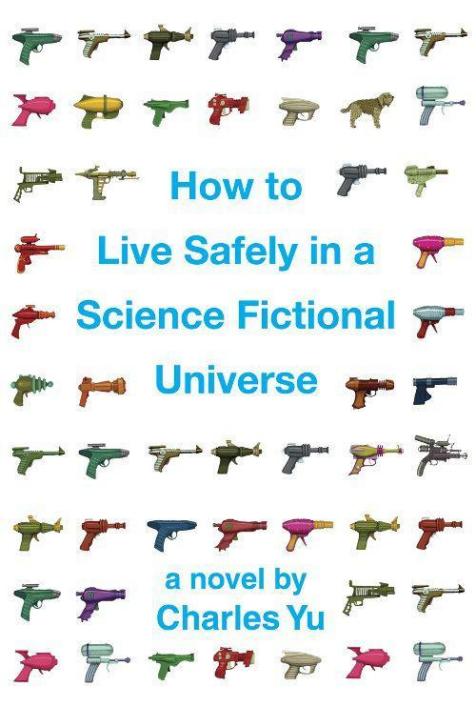
How to Live Safely in a Science Fictional Universe
A Novel
کتاب های مرتبط
- اطلاعات
- نقد و بررسی
- دیدگاه کاربران
نقد و بررسی

July 5, 2010
Yu uses futuristic ideas to explore a mundane theme: writing about the self and the moment in Tristram Shandy–esque digressions. The protagonist, who shares the author's name, spends most of the story interacting with entities that either mirror him (TAMMY, an operating system who reflects his personality) or don't exist (Ed, a "weird ontological entity" in the shape of a dog; Phil, a programmed supervisor who thinks he's human). The conclusion tries to mitigate character-Yu's risk-averse solipsism, but is too quick and abstract to really counter the rest of the book's emotional weight. Mainstream readers will be baffled by the highly nonlinear Oedipal time travel plot, but the passive, self-obsessed protagonist is straight out of the mainstream fiction that many SF fans love to hate, leaving this book without an audience.

Starred review from August 1, 2010
A man frozen in a universe of his own making must pursue the meaning of life.
In this debut novel, Yu (stories: Third Class Superhero, 2006) continues his ambitious exploration of the fantastic with a whimsical yet sincere tribute to old-school science fiction and quantum physics. His hero is Charles Yu, a kind of white-collar mechanic for time machines of the very near future. He's a corporate drone for Time Warner Time, which operates multiple alternate universes for profit. The tech's turf is Minor Universe 31, which is literally a science-fiction playground complete with sexbots, icons of genre fantasy and an unreliable set of physics. It all sounds rather magical—Charles has a memorable run-in with one Linus Skywalker, who carries a big chip on his shoulder about his famous father—but it's really a very lonely world. Charles mourns the loss of his father, who invented time travel before disappearing into its void. His mother lives in a kind of time-assisted living, in which she experiences the same parcel of time again and again. Our narrator's only real companions are Ed, a dog that may or may not exist, and TAMMY, an onboard operating system with a chronic case of self-doubt. "I have seen pretty much everything that can go wrong, the various and mysterious problems in contemporary time travel," says Charles. "You work in this business long enough and you know what you really do for a living. This is self-consciousness. I work in the self-consciousness industry." Inevitably, worlds collide, and Charles shoots his future self in a moment of panic. Then readers will have to reach the proverbial end of the story to find out whether Charles' time loop (conveniently mapped out and including an X event, a point in time when he will learn something about himself) will let him go.
A fascinating, philosophical and disorienting thriller about life and the context that gives it meaning.
(COPYRIGHT (2010) KIRKUS REVIEWS/NIELSEN BUSINESS MEDIA, INC. ALL RIGHTS RESERVED.)

October 1, 2010
Although the title suggests comfortable living in space, Yu leads the reader to an uncomfortable space on Earth, as his debut novel's narrative is quite experimental. In between many chapters, Yu inserts explanations of specific terms, using his fictional world to reflect upon reality and life's experiences. In the middle of the novel, he even pauses and becomes self-conscious about his creative process when writing, reading, and editing the text. In typical Brechtian fashion, he distances the reader from the story to induce contemplation of the issues the text may inspire. The deceptively simple plot can be told in one sentence: a time-travel-machine repairman wants to locate his missing father before his past catches up to him and shoots him dead. Our anxieties and fears are heightened as the protagonist's past gets ever closer. That the protagonist's father devoted his life to creating a time-travel machine allows us to ponder the dilemma of a brilliant person trapped in the role of a family man. VERDICT Fans of Ursula K. Le Guin and "social science fiction," as well as readers of an adventurous nature, will enjoy this book, which has the potential to become a cult classic.--Victor Or, Surrey P.L. & North Vancouver City Lib., B.C.
Copyright 2010 Library Journal, LLC Used with permission.

August 1, 2010
The eponymous lonely-guy narrator in Yus debut novel is a time-machine repairman working in the slightly damaged Minor Universe 31, where people can time-travel for recreational purposesor, Charles muses, is it re-creational purposes, given our desire to rewrite history? Charles dwells in a small module with TAMMY, a cute but insecure operating system, and Ed the dog, who is good company even though hes a weird ontological entity rather than a flesh-and-blood animal. Woebegone Charles has never gotten over the disappearance of his father, a thwarted time-travel pioneer. With Star Wars allusions, glimpses of a future world, and journeys to the past, as well as hilarious and poignant explanations of chronodiegetics, or the theory of the nature and function of time within a narrative space, Yu, winner of the National Book Foundations 5 under 35 Award, constructs a clever, fluently metaphorical tale. A funny, brain-teasing, and wise take on archetypal father-and-son issues, the mysteries of time and memory, emotional inertia, and one sweet but bumbling misfits attempts to escape a legacy of sadness and isolation.(Reprinted with permission of Booklist, copyright 2010, American Library Association.)

























دیدگاه کاربران